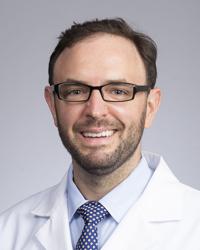Radiation Oncology Residency
About the Radiation Oncology Residency Program
Welcome to the Department of Radiation Oncology Residency Program at Loyola University Medical Center. We appreciate your interest in our program. The department offers a fully accredited four-year residency program for eight residents. Our residency emphasizes multi-disciplinary cancer care, advanced radiotherapeutic technologies and procedures, didactic and clinical teaching, clinical/basic science research, and service to our patients and our discipline.
Our goal is to educate and train physicians to be optimally skilled in the practice of radiation and clinical oncology. We emphasize teaching and evaluating the six core competencies: patient care, medical knowledge, practice-based learning and improvement, communication, professionalism, and system-based practice. Ultimately we intend for our graduating physicians to be outstanding clinicians, potential researchers, and make significant future contributions in the radiation oncology field. Please feel free to contact us if we can be of further assistance.
Program Description
The Loyola/Hines Department of Radiation Oncology was established in July 1985 by Loyola University Chicago to provide radiotherapy for the Loyola University Medical Center and the Hines VA Hospital. This creation of a new, combined program was necessary to form a department large enough to support a training program and to develop the Radiation Oncology Department to its fullest potential.
The Loyola University Medical Center campus is a major tertiary care center for the Chicago metropolitan area as well as its near western suburbs. The campus houses Loyola University Chicago's Stritch School of Medicine, the main hospital, the Loyola Outpatient Center and the Cardinal Bernardin Cancer Center on the east side along First Avenue and is adjacent to the Edward J. Hines Jr. VA Hospital, which is on the west side and accessible by Roosevelt Road at 5th Avenue.
The department of Radiation Oncology has clinic facilities at Loyola University Medical Center, a 567-bed university hospital, and Hines VA Hospital, a 500-bed hospital. We provide services to the entire VISN 12 Veteran Affairs Network specifically Jessie Brown VA (formally West Side VA Hospital and the Lake Side VA Hospital).
Loyola University Medical Center and Hines VA Hospital maintain a fully accredited four-year program in radiation oncology. Residents start radiation oncology training after completion of a transitional PGY-1 year or internship in internal medicine, pediatrics, surgery or surgical specialties, obstetrics & gynecology, or family medicine. This PGY-1 year must include at least nine months of direct patient care in medical and/or surgical specialties other than radiation oncology.
|
William Small Jr., MD, FACR, FASTRO |
Alec M. Block, MD |
Program Mission and Goals
Mission
The mission of the Department of Radiation Oncology at Loyola Medicine is to graduate physicians who are compassionate and patient-centered clinicians, skilled researchers, passionate educators, and future leaders in the field of radiation oncology. Within this mission, we also take pride in providing exceptional cancer care and state of the art treatment to our nation's veterans at Edward Hines, Jr. VA Hospital.
We are committed to excellence in patient care and aim to educate and train our residents in all aspects of clinical and radiation oncology. We strive to provide a robust culture of research excellence and engage residents to lead impactful clinical and/or translational research that impacts the current and future care of our patients. We aim to individualize the resident's experience to meet the career and aspirational goals of each trainee.
Our engaged faculty mentors strive to provide a multitude of opportunities to our trainees in organized medicine and service to our field. We aim to provide an abundance of opportunities so that residents are well prepared for their board examinations and maximally competitive for the best jobs in the country. It is the goal of our training program to establish a superior learning environment and a culture of respect, diversity, and inclusion.
Goals
We provide a robust educational experience in order to educate and train physicians to be optimally skilled in the practice of radiation and clinical oncology when they enter autonomous clinical practice. To do so, we maintain a curriculum that is disease-centered and emphasizes preparation for board examinations and certification by the American Board of Radiology (ABR). In addition, we practice and teach how to provide patients and their families with compassionate, comprehensive, and quality medical care while demonstrating a responsiveness to the patient's needs regardless of self-interest.
We provide an environment that encourages and facilitates education, research, and innovation with formal courses on these aspects that are of particular interest to the trainee. We provide formal training in quality and maintain engaged residents in hospital and departmental quality committees. It is our goal to customize the residency experience for the career goals of our trainees to make them maximally competitive for their ideal job. We aim to provide mentorship, guidance, and opportunity within the field of radiation oncology.
Lastly, we emphasize teaching and evaluating the six core competencies: patient care, medical knowledge, practice-based learning and improvement, communication, professionalism, and system-based practice to ensure that our graduates are compassionate, responsive, empathetic, responsible, and capable within their health system and service to their communities. We are genuinely committed to a diverse and inclusive environment for our residents, faculty, and staff. We believe this environment helps us connect with and serve our community better. We are continually working to broaden the diversity within our department to best serve our patients in the greater Chicago area.
Core Competencies
The resident will obtain competency to the level expected of a new practitioner in the six areas below as specified by the ACGME: Competency of these six areas will be measured by various evaluations.
Patient Care
The resident is able to provide compassionate, appropriate and effective patient care for the treatment of health problems and promotion of health. Resident understands how to appropriately prioritize patient problems and develop an appropriate diagnostic plan, prescribes medications appropriately, and shows an appropriate balance between attention to the details of patient care and the overall context of treating the patient's illness. The resident obtains consultations appropriately, and is able to perform technical procedures completely, when appropriate.
Medical Knowledge
The resident demonstrates knowledge of established and evolving biomedical, clinical, epidemiological, and social/behavioral sciences as well as the application of this knowledge to patient care. Resident is able to assess diagnostic information critically and constructively, and recognizes the psychosocial aspects of illness. Resident is able to critically evaluate the medical literature and apply new knowledge to the delivery of safe and effective patient care.
Practice-Based Learning and Improvement
The resident is able to critically evaluate the care of their patients, appraise and assimilate scientific evidence, and continuously improve patient care delivered on the basis of ongoing self-evaluation and learning. The resident uses knowledge to educate patient families, medical students, allied health personnel, peers, and other health professionals as appropriate. Resident is capable of self-identifying strengths, deficiencies, and the limits of their knowledge and expertise. The resident is receptive to constructive criticism (formative evaluation feedback) regarding the care of patients and physician performance. Resident is able to set learning and improvement goals, and identify and perform activities appropriate to meeting those goals.
Interpersonal and Communication Skills
The resident demonstrates interpersonal and communication skills that result in effective information exchange and collaboration with patients, families and other health professionals. These skills include the ability to communicate across a broad range of socio-economic and cultural backgrounds and ability to communicate with physicians, health professionals, and health related agencies effectively. The resident is able to maintain comprehensive, timely and readable medical records. The resident can work effectively as a member or leader of a healthcare team and serve appropriately as a consultant to other physicians and health professionals. Resident is able to clearly lead daily work rounds, when appropriate.
Professionalism
The resident is committed to carrying out professional responsibilities and adhering to ethical principles. The resident demonstrates respect for patient privacy and autonomy and is accountable to patient, society and the medical profession for actions. Resident demonstrates compassion, integrity and respect for others as well as responsiveness to patient needs that supersede self-interest.
The resident demonstrates sensitivity and responsiveness to a broad patient population including diversity in gender, age, culture, race, religion, disability, and sexual orientation. The resident demonstrates the ability to manage personal stress effectively. The resident is expected to answer pages or messages in a timely fashion. Resident understands how to maintain appropriate professional boundaries, and demonstrates integrity, honesty and compassion. Resident completes assigned tasks in a timely fashion.
Systems-Based Practice
Featured Videos
Radiation Oncology Residency at Loyola University Medical Center
Radiation Oncology Residency Virtual Tour


